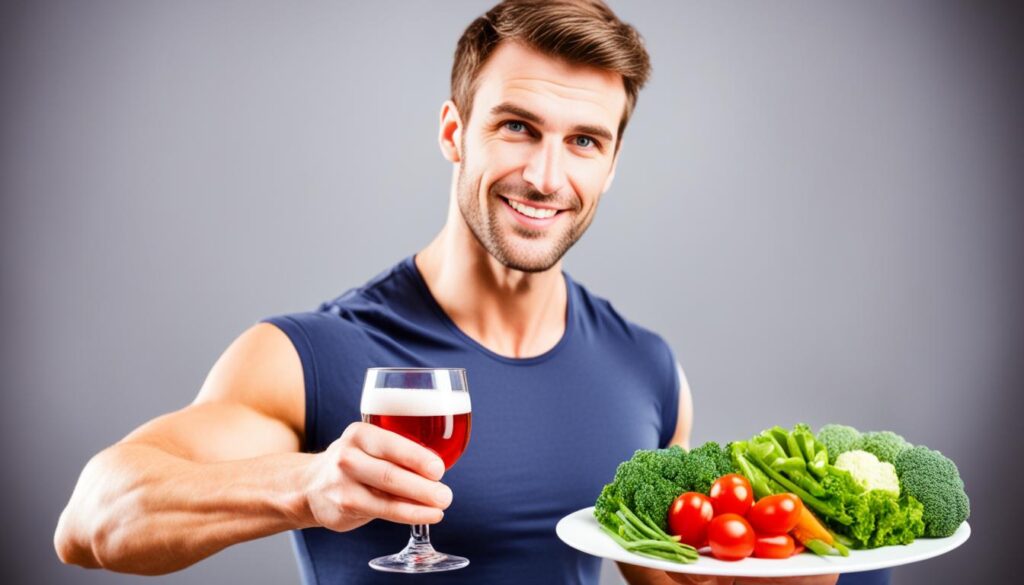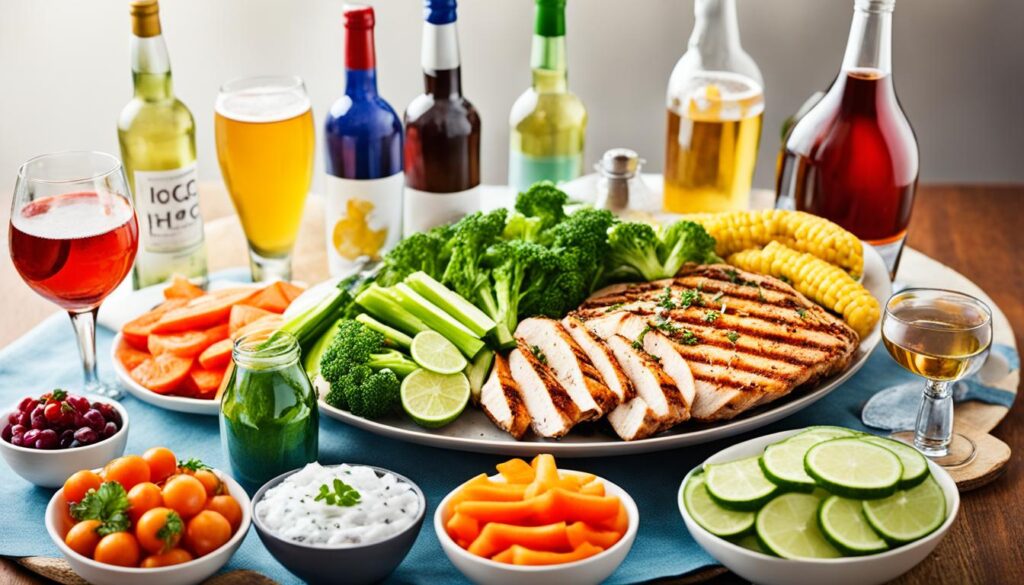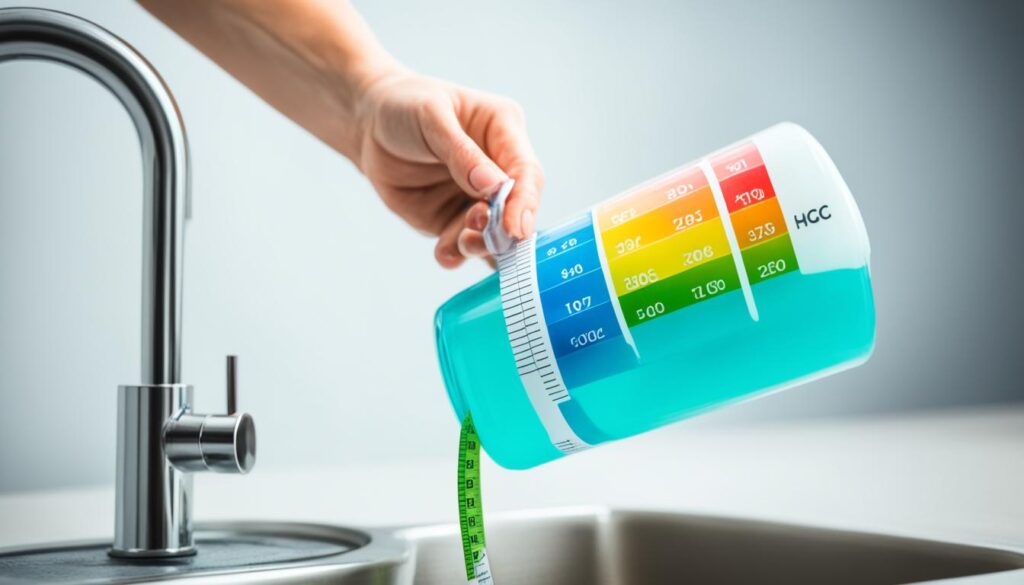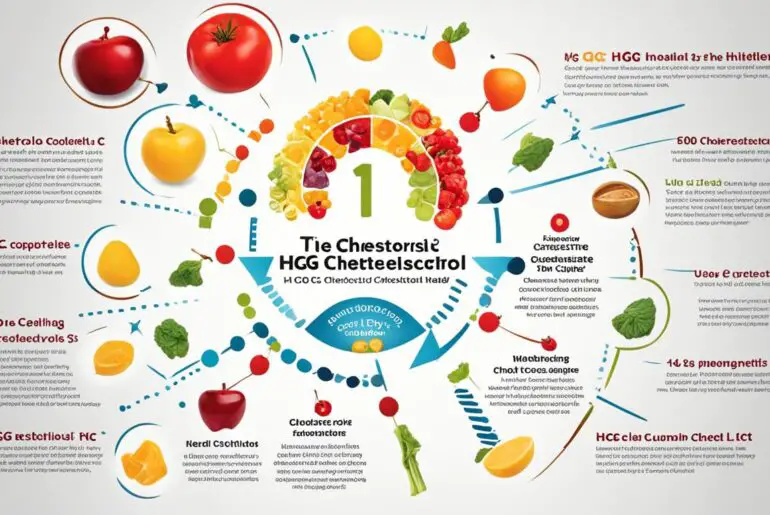Are you following the HCG Diet and wondering if you can indulge in a glass of wine or a cocktail? Or perhaps you’ve heard conflicting information about the effects of alcohol on weight loss and are curious to know the truth. Well, you’ve come to the right place!
Many people mistakenly believe that a small amount of alcohol won’t affect their weight loss progress on the HCG Diet. But is this really the case? Let’s dive into the facts and uncover the truth about alcohol consumption on the HCG protocol.
Key Takeaways:
- Alcohol is high in calories, sugar, and carbs, making it detrimental to weight loss on the HCG Diet.
- Drinking alcohol can hinder fat burning and metabolism, interfering with the effectiveness of the HCG hormone.
- Avoiding alcohol during the low-calorie phase of the HCG Diet is crucial for achieving optimal results.
- If alcohol consumption is unavoidable, choose non-sugary, non-beer alcoholic drinks in moderation and prioritize zero-calorie, zero-sugar mixers.
- Being mindful of portion sizes and making healthy choices while consuming alcohol is essential for success on the HCG Diet.
Now that we’ve piqued your interest, let’s explore the impact of alcohol on weight loss, Dr. Simeons’ advice on alcohol consumption, and strategies for quitting or reducing alcohol intake while on the HCG Diet. By the end of this article, you’ll have a better understanding of whether alcohol can coexist with your HCG Diet journey.
The Impact of Alcohol on Weight Loss
Drinking alcohol while on the HCG Diet can have significant effects on weight loss progress and overall results. It is important to understand the impact of alcohol consumption and the restrictions that should be followed during the HCG Diet journey.
When alcohol is consumed while on the HCG Diet, it can hinder weight loss efforts in several ways. Firstly, alcohol stops the burning of fat and decreases metabolism, potentially interfering with the HCG hormone’s effect on the body’s metabolic processes. This can slow down the rate at which the body breaks down stored fat and leads to weight loss plateaus.
Additionally, when alcohol is present in the bloodstream, the body prioritizes using it for energy before utilizing protein, fat, or carbohydrates. This means that any calories consumed from alcohol are preferentially burned off first, leaving the calories from other sources, such as food, to be stored as excess fat. While only a small percentage of the calories from alcohol are directly converted into fat, the overall impact on weight loss can be significant.
It is recommended to restrict alcohol consumption during the HCG Diet for optimal results. By avoiding alcohol, individuals can minimize disruptions to the body’s metabolism, preserve fat-burning processes, and achieve more consistent and successful weight loss.
It is important to note that the impact of alcohol on weight loss can vary from person to person. Factors such as alcohol tolerance, individual metabolism, and the specific HCG Diet protocol being followed can all influence the degree to which alcohol affects weight loss progress.
Overall, it is advisable to prioritize the HCG Diet and its guidelines to maximize weight loss results. Restricting alcohol consumption while on the HCG Diet can help individuals stay on track, overcome weight loss plateaus, and achieve their desired goals.
Dr. Simeons’ Advice on Alcohol Consumption

Dr. Simeons, who formulated the HCG Diet, advises against alcohol consumption during the low-calorie phase of the diet. He recommends avoiding alcohol for the duration of this phase, which typically lasts between 21 and 40 days. Once the maintenance phase is reached, Dr. Simeons suggests enjoying “A” glass of wine. Following his advice can help ensure the best results on the HCG Diet.
Alcohol and Caloric Intake
When it comes to weight loss, it is not just about the food we eat but also the beverages we consume. Alcohol, in particular, can have a significant impact on our caloric intake, making it important to be mindful of alcohol consumption while following the HCG Diet.
According to reports, alcohol accounts for about 16% of adult drinkers’ total energy intake in the United States. This means that consuming alcohol can add unnecessary calories to your diet, hindering your progress in achieving weight loss goals.
The HCG Diet involves a caloric reduction to promote weight loss. By restricting calories from food, the body is forced to burn stored fat for energy. However, when alcohol is consumed, it provides additional calories that the body prioritizes for energy use before burning fat. This can disrupt the fat-burning processes and make it more difficult to shed those extra pounds.
It is crucial to be aware of the energy content of alcohol and its potential impact on weight loss. Here is a breakdown of average calorie content in common alcoholic beverages:
| Beverage | Calories (per 6 oz serving) |
|---|---|
| Beer | Approximately 150-200 calories |
| Wine | Approximately 120-150 calories |
| Liquor (80 proof) | Approximately 95-120 calories |
As seen in the table, alcoholic beverages can contribute significantly to overall energy intake. These calories can add up quickly, especially if multiple drinks are consumed in one sitting.
To put it into perspective, consider the following scenario:
John decides to have a few beers with friends after work. He has three 12 oz beers, each containing approximately 150 calories. In total, John consumes 450 calories from the beer alone.
These additional calories can easily derail weight loss progress, making it more challenging to reach your desired goals.
That being said, it does not mean you have to completely eliminate alcohol from your life while following the HCG Diet. It is essential to find a balance that aligns with your health and weight loss goals.
If you decide to consume alcohol, follow these tips to minimize its impact:
- Opt for drinks with fewer calories, such as light beers or spirits mixed with zero-calorie mixers.
- Avoid sugary cocktails or sweetened alcoholic beverages.
- Limit your overall alcohol intake.
- Be mindful of portion sizes.
By making conscious choices and being aware of the caloric content of alcoholic beverages, you can better manage your overall energy intake and continue on your journey toward successful weight loss.
Choosing the Right Alcoholic Beverages

If alcohol consumption is unavoidable on the HCG Diet, it is essential to make wise choices. Opt for non-sugary, non-beer alcoholic drinks in moderation. The recommended volume is 1.5 oz of straight alcohol or 4 oz of red or white wine. It is crucial to avoid mixes containing sugar, as they can add unnecessary calories and interfere with weight loss. When selecting alcoholic beverages, opt for choices that minimize caloric intake and prioritize zero-calorie, zero-sugar mixers.
If you’re craving a glass of red wine, choose a dry option such as Pinot Noir or Cabernet Sauvignon. These wines typically have fewer residual sugars and are lower in calories compared to sweet or dessert wines.
| Alcoholic Beverage | Calories | Sugar Content |
|---|---|---|
| Red Wine (4 oz) | 90-120 | 0-5g |
| White Wine (4 oz) | 90-100 | 0-5g |
| Vodka (1.5 oz) | 97 | 0g |
| Tequila (1.5 oz) | 96 | 0g |
| Whiskey (1.5 oz) | 105 | 0g |
Source: USDA National Nutrient Database
Remember to consume alcoholic beverages in moderation and to monitor your overall caloric intake to ensure the best results while on the HCG Diet.
Effects of Alcohol on Appetite and Snacking
When it comes to alcohol consumption, it’s important to consider its impact on the appetite and snacking habits, especially while following the HCG Diet. Alcohol can have a significant effect on increasing appetite and leading to cravings for unhealthy, carb-filled snacks.
One of the primary reasons alcohol affects appetite is its impact on the appetite centers of the brain. It can activate these centers, making a person feel hungrier than they normally would. This heightened appetite often leads to snacking, especially on readily available unhealthy options that are often served alongside alcohol.
| Effects of Alcohol on Appetite and Snacking | |
|---|---|
| Increased appetite | Cravings for carb-filled snacks |
When alcohol is consumed, it can stimulate the desire for carb-filled snacks such as chips, fries, or sugary treats. These snacks not only add unnecessary carbs but also contribute to weight gain and hinder progress on the HCG Diet.
To avoid the negative effects of alcohol on appetite and snacking while on the HCG Diet, it is important to be mindful of the snacks offered with alcohol. Choose healthier options such as raw vegetables, lean protein sources, or low-carb alternatives. Avoid unnecessary carb intake as it can disrupt the balance of the HCG Diet and hinder weight loss progress.
By making conscious choices and being aware of the potential effects of alcohol on appetite and snacking, individuals on the HCG Diet can stay on track towards achieving their weight loss goals.
Difficulty in Controlling Portions and Making Healthy Choices

When it comes to alcohol consumption, controlling portions and making healthy choices can be challenging. The effects of alcohol often weaken inhibitions and make it difficult to maintain self-control when it comes to eating. Let’s explore how alcohol impacts portion control and food choices on the HCG Diet.
Alcohol suppresses control, making it challenging to recognize when you have had enough to eat. This lack of awareness can lead to overeating and consuming larger portions than necessary. Combined with an increased feeling of hunger induced by alcohol, individuals may find themselves making poor food choices, opting for unhealthy, high-calorie options instead of nutritious ones.
To combat these difficulties, it is crucial to be mindful of portion sizes and make conscious, healthy choices when consuming alcohol. Practice portion control by measuring your servings and being aware of your body’s hunger and satiety signals. Choose nutritious food options that align with the HCG Diet guidelines, such as lean proteins, vegetables, and low-calorie snacks.
The key to success lies in maintaining self-discipline and making mindful choices even when alcohol is involved.
Importance of Portion Control
Portion control is essential for weight management and achieving your goals on the HCG Diet. It helps prevent overeating, enables you to have a balanced diet, and supports healthy weight loss. By regulating the amount of food you consume, you can ensure that you are meeting your nutritional needs while staying within your calorie limits.
Controlling portions becomes even more crucial when alcohol is in the picture. Alcohol can impair judgment and lead to mindless eating, making it easier to exceed your desired calorie intake. By focusing on portion control, you can maintain a balanced and controlled approach to your food choices.
Remember, moderation is key. By being aware of your portions, you can enjoy the occasional drink while staying on track with your weight loss journey.
Healthy Food Choices
When consuming alcohol, it is essential to make healthy food choices that complement the HCG Diet and support your goals. Opt for nutrient-dense foods that provide necessary vitamins, minerals, and fiber without adding excessive calories.
Avoid greasy, fried foods and instead choose options such as fresh fruits, vegetables, lean proteins, and whole grains. These choices will help you maintain your energy levels, support weight loss, and nourish your body while enjoying the occasional drink.
Balancing alcohol consumption with nutrient-rich foods is crucial for overall well-being and success on the HCG Diet.
| Alcoholic Beverages to Avoid | Healthier Alternatives |
|---|---|
| Sugary mixed drinks | Light beer |
| Cocktails with sugary mixers | Wine spritzers |
| Sweet wines | Wine or spirits with calorie-free mixers, like club soda or seltzer |
By making judicious choices and considering healthier alcohol options, you can navigate social situations without compromising your progress on the HCG Diet.
Having a clear understanding of the impact of alcohol on portion control and food choices is essential for success on the HCG Diet. The combination of lowered inhibitions and increased hunger can pose difficulties, but by being mindful of portions, making healthy choices, and practicing self-discipline, you can stay on track and achieve your weight loss goals.
Poor Sleep and Alcohol Consumption

Excessive alcohol consumption can have detrimental effects on sleep quality, leading to disruptions in weight loss efforts. When alcohol is consumed before bedtime, it can cause falls in blood sugar levels during the night, leading to disturbances in sleep patterns. These disruptions can range from difficulty falling asleep to frequent awakenings throughout the night.
Poor sleep has been linked to weight gain and increased food cravings, which can hinder progress on the HCG Diet. Studies have shown that individuals who experience inadequate sleep tend to consume more calories, particularly from high-fat and high-sugar foods. Additionally, poor sleep is associated with decreased activity levels the following day, further impacting weight management efforts.
Consistent alcohol consumption can also lower metabolism over time, making it more challenging to achieve weight loss goals. The combination of disrupted sleep, increased cravings, and decreased activity levels can create a cycle that hampers progress on the HCG Diet.
To optimize weight loss during the HCG Diet, it is advisable to limit alcohol intake. By reducing alcohol consumption, individuals can improve sleep quality, enhance energy levels, and promote overall well-being. Prioritizing restful sleep and avoiding excessive alcohol consumption can significantly contribute to successful weight loss outcomes.
| Effects of Alcohol on Sleep | Impact on Weight Loss | Activity Levels |
|---|---|---|
| Disrupted sleep patterns | Weight gain | Decreased activity levels |
| Falls in blood sugar levels during the night | Increased food cravings | |
| Potential decrease in physical activity the following day |
Strategies for Quitting or Reducing Alcohol Consumption on HCG

Quitting or reducing alcohol consumption while on the HCG Diet can be challenging. However, there are several strategies that can help make the process easier:
- Stay Hydrated: Drinking plenty of water can help reduce cravings for alcohol. It keeps you hydrated and helps curb the desire to reach for a drink.
- Engage in Alternative Activities: Distract yourself from the desire to drink by engaging in alternative activities. Exercise, hobbies, or spending time with loved ones can shift your focus away from alcohol.
- Avoid Tempting Situations: Steer clear of bars, parties, and restaurants where alcohol is readily available. By avoiding tempting situations, you can reduce the likelihood of consuming alcohol.
- Remind Yourself of Weight Loss Goals: Keep your weight loss goals in mind and remind yourself of the potential benefits of the HCG Diet. Motivate yourself to stay committed to your health and prioritize your well-being.
Remember, everyone’s journey is unique, so it’s important to find what works best for you. Commit to prioritizing your health during the HCG Diet and stay determined to succeed.
Conclusion
Alcohol consumption is not recommended during the low-calorie phase of the HCG Diet. Drinking alcohol can hinder weight loss progress due to its high calorie, sugar, and carb content. It can also impact appetite, leading to unhealthy snacking choices and impair decision-making abilities. Additionally, alcohol can interfere with the body’s metabolism, potentially sabotaging the effectiveness of the HCG Diet.
While it may be possible to consume alcohol in moderation once the maintenance phase is reached, it is crucial to be mindful of the choices made. Prioritizing health by making smart and informed decisions will enhance the overall effectiveness of the HCG Diet. By abstaining from alcohol during the low-calorie phase and making wise choices during the maintenance phase, individuals can optimize their weight loss results and achieve their goals on the HCG Diet.
In conclusion, it is best to avoid alcohol consumption while on the HCG Diet. By focusing on a balanced and nutritious dietary plan and incorporating healthy lifestyle habits, individuals can maximize the benefits of the HCG protocol and achieve their desired weight loss outcomes.
FAQ
Can I drink alcohol while on the HCG Diet?
Alcohol consumption is not recommended on the HCG Diet as it can have negative effects on weight loss. Alcohol is high in calories, sugar, and carbs, especially in mixed drinks and beer. It also affects the appetite centers of the brain, making a person feel hungrier than usual. Additionally, the snacks typically offered with alcohol are often unhealthy and carb-filled. Alcohol consumption can impair decision-making capabilities and may interfere with HCG’s effect on metabolism. It is best to avoid alcohol during the low-calorie phase of the HCG Diet.
How does alcohol impact weight loss on the HCG Diet?
Drinking alcohol while on the HCG Diet can hinder weight loss progress. Alcohol stops fat burning and decreases metabolism, potentially interfering with HCG’s effect on metabolism. When alcohol is present in the bloodstream, the body uses it for energy before using protein, fat, or carbs, which can lead to the storage of excess fat. Only a small percentage of the calories from alcohol are turned into fat, but the overall impact on weight loss can be significant. It is recommended to restrict alcohol consumption during the HCG Diet.
What is Dr. Simeons’ advice on alcohol consumption during the HCG Diet?
Dr. Simeons, who formulated the HCG Diet, advises against alcohol consumption during the low-calorie phase of the diet. He recommends avoiding alcohol for the duration of this phase, which typically lasts between 21 and 40 days. Once the maintenance phase is reached, Dr. Simeons suggests enjoying “A” glass of wine. Following his advice can help ensure the best results on the HCG Diet.
How does alcohol affect caloric intake on the HCG Diet?
Alcoholic beverages can contribute significantly to total energy intake. In the United States, alcohol has been reported to account for about 16% of adult drinkers’ total energy intake. This is especially relevant as the HCG Diet involves a caloric reduction to promote weight loss. Drinking alcohol can add unnecessary calories to the diet, making it more difficult to achieve weight loss goals. It is important to be mindful of alcohol consumption when following the HCG Diet.
What are the guidelines for choosing alcoholic beverages on the HCG Diet?
If alcohol consumption is unavoidable on the HCG Diet, it is essential to make wise choices. Opt for non-sugary, non-beer alcoholic drinks in moderation. The recommended volume is 1.5 oz of straight alcohol or 4 oz of red or white wine. It is crucial to avoid mixes containing sugar, as they can add unnecessary calories and interfere with weight loss. When selecting alcoholic beverages, opt for choices that minimize caloric intake and prioritize zero-calorie, zero-sugar mixers.
How does alcohol affect appetite and snacking on the HCG Diet?
Alcohol consumption can increase appetite and lead to cravings for unhealthy, carb-filled snacks. The effect of alcohol on the appetite centers of the brain can make a person feel hungrier than they normally would. This often leads to snacking on unhealthy options that are readily available when alcohol is served. It is important to be mindful of the snacks offered with alcohol and to avoid unnecessary carb intake while on the HCG Diet.
Does alcohol impact portion control and healthy food choices on the HCG Diet?
Drinking alcohol can make portion control difficult and weaken inhibitions when it comes to making healthy food choices. Alcohol suppresses control and can make it challenging to recognize when you have had enough to eat. At the same time, it can increase hunger, leading to larger portions and poor food choices. The combination of lowered inhibitions and increased hunger can pose difficulties for individuals on the HCG Diet. It is crucial to be mindful of portion sizes and to make conscious, healthy choices when consuming alcohol.
How does alcohol consumption affect sleep on the HCG Diet?
Alcohol consumption can lead to poor sleep, which can negatively impact weight loss efforts. Excessive alcohol consumption can cause falls in blood sugar during the night, leading to disrupted sleep patterns. Poor sleep is associated with weight gain and decreased activity levels the following day. Consistent alcohol consumption can further lower metabolism and hinder weight loss progress. It is advisable to limit alcohol intake while on the HCG Diet to avoid these potential negative effects.
What strategies can help me reduce or quit alcohol consumption on the HCG Diet?
Quitting or reducing alcohol consumption while on the HCG Diet can be challenging. However, several strategies can make the process easier. Staying hydrated by drinking plenty of water can help reduce cravings for alcohol. Engaging in alternative activities, such as exercise or hobbies, can distract from the desire to drink. Avoiding tempting situations, such as bars and restaurants, can also make it easier to stick to the HCG Diet. Reminding oneself of weight loss goals and the potential benefits of the HCG Diet can provide motivation to avoid alcohol. It is important to find what works best for individual circumstances and make a commitment to prioritize health during the HCG Diet journey.
What is the conclusion regarding alcohol consumption on the HCG Diet?
Alcohol consumption is not recommended during the low-calorie phase of the HCG Diet. Alcohol can hinder weight loss, as it is high in calories, sugar, and carbs. It can affect appetite, lead to unhealthy snacking, impair decision-making, and interfere with metabolism. While it may be possible to consume alcohol in moderation once the maintenance phase is reached, it is important to be mindful of the choices made and their potential impact on weight loss goals. Prioritizing health and making smart choices will enhance the effectiveness of the HCG Diet.




